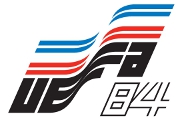Tournament Overview

1984 saw France hold its second major international tournament, forty-six years after its first – the FIFA World Cup in 1938. Germany entered the tournament as defending champions, having secured the title for a second time four years earlier in Italy; as in 1980, the 1984 tournament featured eight finalists in two groups of four, but with the top two in each group progressing to a semi-final stage as opposed to the previous system where the group winners advanced straight to the final. The third-place play-off was also scrapped.
Fifteen games were played in which a total of forty-one goals were scored, and average of 2.73 per match which was an increase on the 1980 figure. Apart from their semi-final against Portugal where then fell 2-1 behind in extra time before winning 3-2, the hosts France dominated the competition from beginning to end. They won every game, scoring fourteen goals in their five games with their inspired captain Michel Platini scoring nine, including two hattricks. By defeating Spain 2-0 in the final in Paris, France won its first major international trophy.
For viewers in the United Kingdom, the 1984 tournament was defined by the utterly diabolical television coverage. With all of the home nations having failed to qualify, both of the major terrestrial broadcasters refused to commit themselves to the tournament: the BBC would turn out what amounted to little more than short match reports and show only two live matches, while ITV pulled out altogether. One of the live matches was Germany’s final group match against Spain in Paris, with the other being the final itself.
Qualifying Campaign and pre-tournament build-up
The German team under Jupp Derwall had reached the World Cup final of 1982, but the team that had left Spain as Vize-Weltmeister hardly lived up to the billing. 1982 closed with a first-ever defeat at the hands of Northern Ireland in their opening Euro 1984 qualifying fixture, and while 1983 saw six wins out of ten and qualification for Euro 1984 the quality of football was not of the high standards set by previous German sides. There were glimpses of occasional brilliance – usually through the outstanding Karlheinz Rummenigge and the young Bremen striker Rudi Völler – but the style of play was negative, attritional, overly tactical and at times depressingly dull.
These considerations aside, Derwall and his assistant Erich Ribbeck were still managing to churn out results when it really mattered – though his side made it to the finals by the very skin of their teeth – pipping Northern Ireland on goal difference, despite losing to them twice. By rights they should have have been eliminated, but the inability of the Northern Irish to defeat the likes of Turkey and Albania away from home cost them dearly.
Apart from the two 1-0 defeats at the hands of the Irish the Mannschaft dropped points in only one other game, a 0-0 draw with Austria in Vienna. A win over the Austrians in the return fixture, eight goals in two games against Turkey and two 2-1 wins over Albania were enough to see take them to France to defend their European title – just.
The run-in to the finals saw five friendly games, which saw victories over Bulgaria, Belgium, the Soviet Union, and World Champions Italy – with one defeat against Euro 1984 hosts France. Once again Derwall’s side seemed to be doing just about enough – although they did let a three-goal lead slip against the Bulgarians, none of the performances were entirely convincing. The 1-0 win over Belgium had been achieved through a late Rudi Völler penalty, and they had to come from behind to beat the Soviets with Andy Brehme scoring the winner in the final minute.
Germany’s Tournament in brief
Germany’s performance in the finals was little more than a continuation of the form they had shown in the qualifying round, with a bore-draw against Portugal and a well-worked win against tournament debutants Romania. Needing just a draw against final group opponents Spain to make sure of their place in the last four, the Mannschaft had a foot in the semi-final until the final minute when the unheralded Antonio Maceda ended it all in a blur of Spanish red and blue.
A goalless draw in the other match being played at the same time between Portugal and Romania would have seen Derwall’s side sneak through by virtue of having scored more goals than the Portuguese with both teams on three points, but a Nené strike nine minutes from time ensured that both Iberian teams would progress at the Mannschaft’s expense. It would be the first time that any German side had not made it to the final of the European Championships since 1968.
The aftermath of Germany’s failure to progress beyond the first phase also saw the dismissal of Jupp Derwall – the first time an incumbent Nationaltrainer had been sacked in the entire history of the Nationalmannschaft.
v Portugal, First Phase Group B, Strasbourg, 14.06.1984 View Report »
v Romania, First Phase Group B, Lens, 17.06.1984 View Report »
v Spain, First Phase Group A, Paris, 20.06.1984 View Report »
